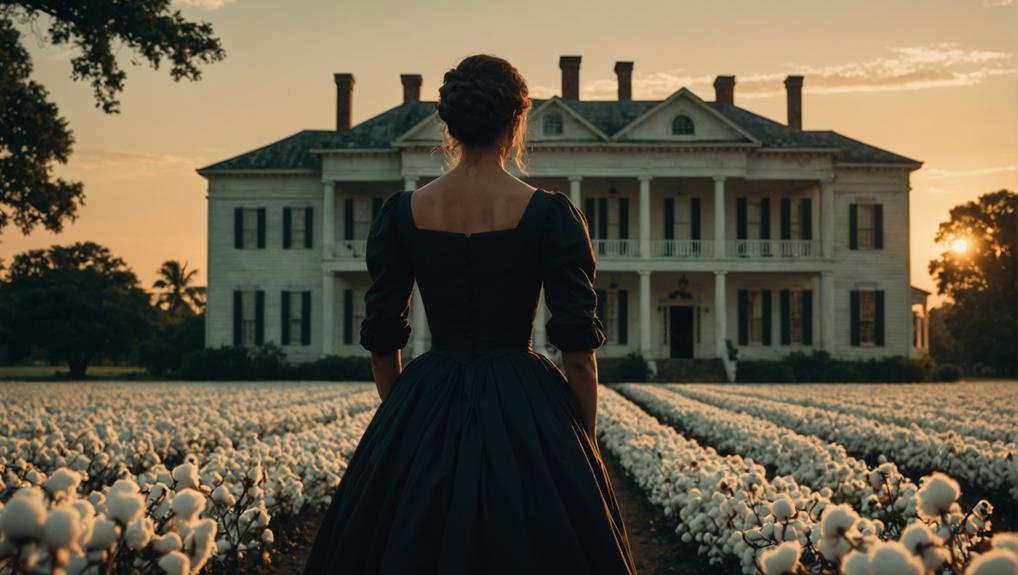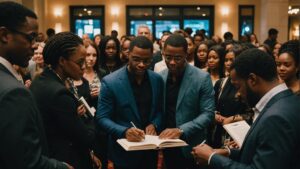Discover the epic journey of 'Gone with the Wind,' delving into Scarlett O'Hara's trials during the Civil War and Reconstruction era. Witness her tumultuous relationships, the burning of Atlanta, and her resilience through poverty. Unfolded in a Southern plantation setting, the tale weaves personal struggles with historical events, portraying strength and growth. The saga intricately explores love, societal norms, and sacrifice against a transformative backdrop, resonating across generations.
Plot Overview
Setting off on a tumultuous journey through the Civil War and Reconstruction Era, 'Gone with the Wind' explores Scarlett O'Hara's evolution from adolescence to adulthood in Georgia. Scarlett's infatuation with Ashley Wilkes, her marriages, tragedies, and tumultuous relationship with Rhett Butler weave the intricate plot of the novel. Against the backdrop of the American Civil War and the societal upheaval during the Reconstruction Era, Scarlett's resilience and growth unfold vividly.
The novel captures pivotal events like the burning of Atlanta and Scarlett's struggles with poverty, showcasing her tenacity amidst adversity.
The Southern plantation setting and the intricate web of relationships further enrich the narrative, painting a vivid picture of the era's complexities. As Scarlett navigates the challenges of love, loss, and survival, readers witness her transformation against the backdrop of a changing society.
'Gone with the Wind' intricately intertwines personal struggles with historical events, making Scarlett's journey a compelling exploration of resilience and growth amidst turmoil.
Character Analysis
Explore the intricate dynamics between Scarlett, Rhett, Melanie, and Ashley to understand how their interactions drive the narrative.
Analyze the evolution of Scarlett's personality and the impact of Rhett's charisma on her development.
Assess how the contrasting traits of Melanie and Scarlett contribute to the overarching themes of the novel.
Character Dynamics Exploration
In 'Gone With the Wind,' the character dynamics are intricately woven, revealing the evolution of Scarlett O'Hara from a self-centered Southern belle to a determined survivor.
- Scarlett O'Hara's character growth is a central theme, showcasing her transformation from a Southern belle to a determined survivor.
- Rhett Butler's charismatic and complex personality adds depth to the narrative, shaping Scarlett's journey and relationships.
- The love triangle dynamics between Scarlett, Ashley Wilkes, and Rhett Butler create intense emotional tension and drive much of the conflict in the story.
- Mammy's steadfast loyalty and wisdom serve as a stabilizing presence amidst the societal upheavals depicted in the novel.
These character dynamics not only highlight Scarlett's journey but also demonstrate the interplay between different personalities and their responses to the challenges of the time, enriching the narrative of 'Gone With the Wind.'
Personality Evolution Analysis
Scarlett O'Hara's transformation from a headstrong Southern belle to a resilient survivor amidst war and loss is a proof of the intricate evolution of personalities in 'Gone With the Wind'. Initially depicted as a self-centered and determined young woman, Scarlett's journey through societal upheaval molds her into a resilient survivor, showcasing her adaptability and strength in the face of adversity.
Rhett Butler, with his charismatic and complex demeanor, undergoes a transformation influenced by his relationships with Scarlett and the changing world around him.
Ashley Wilkes, known for his honorable yet conflicted nature, adds layers to the love triangle, highlighting the complexities of human emotions and societal expectations.
Melanie Hamilton, characterized by unwavering kindness and loyalty, plays a pivotal role in shaping the dynamics among the main characters, showcasing the intricacies of relationships amidst turmoil.
The evolution of these personalities drives the narrative forward, painting a vivid portrait of love, resilience, and the human spirit.
Theme Portrayal Assessment
Amidst the intricate character dynamics of 'Gone With the Wind', Rhett Butler's charismatic presence greatly influences the thematic portrayal within the narrative.
Scarlett O'Hara's character development from a headstrong Southern belle to a resilient survivor is intricately intertwined with Rhett Butler's complex personality. Their tumultuous relationship and interactions reflect societal norms and gender roles, exploring themes of love, sacrifice, and personal growth.
Through the lens of Scarlett and Rhett's dynamic, the novel explores the resilience required to navigate a war-torn society, challenging traditional expectations and fostering personal growth.
The relationships among characters like Scarlett, Ashley Wilkes, and Melanie Hamilton further shape the narrative, highlighting the themes of love, sacrifice, and the impact of societal divisions on personal choices.
In 'Gone With the Wind', character interactions serve as a mirror to the societal landscape, illuminating the struggles and triumphs of individuals in the face of adversity.
Biographical Background
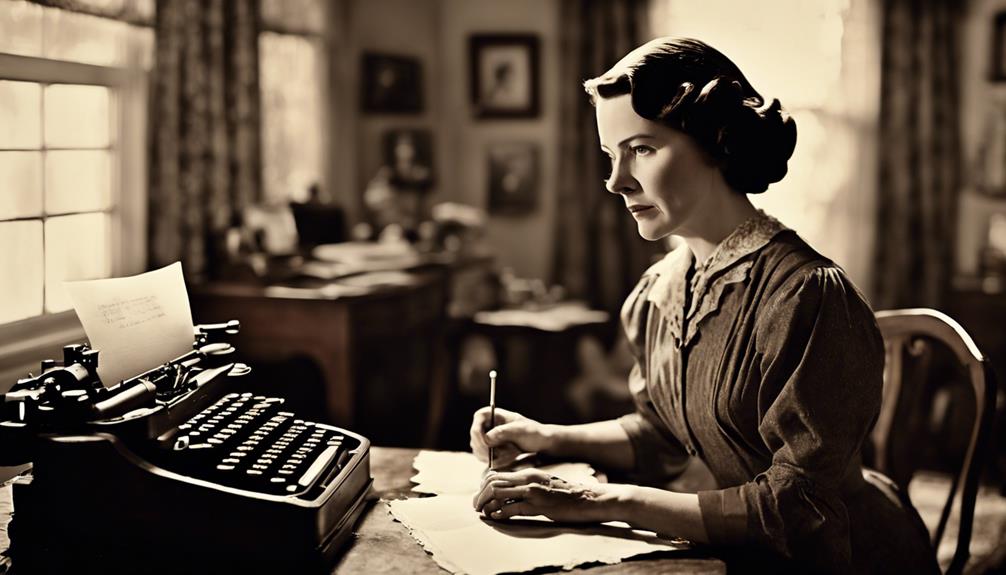
Margaret Mitchell, the renowned author of 'Gone with the Wind', was born in Atlanta, Georgia in 1900. Mitchell, an American journalist, explored the Southern backdrop of the Civil War for her iconic book. Growing up in Georgia, Mitchell's roots intertwined with the war-torn history of the South, fueling her passion for storytelling.
Before penning her legendary novel, Mitchell worked as a journalist for The Atlanta Journal, honing her craft and developing a keen eye for detail.
The Pulitzer Prize-winning 'Gone with the Wind' was born from Mitchell's deep-seated connection to the tales of her ancestors and the struggles they faced during the war. After an ankle injury confined her to bed rest, Mitchell embarked on a literary journey that would captivate readers for generations. Her dedication to researching and writing the book paid off, solidifying her name in the annals of American literature.
Themes Explored
Examine the character complexities and historical accuracies within 'Gone with the Wind' as it delves into the intricacies of relationships and societal norms during a tumultuous period.
Analyze how the novel portrays the evolution of characters like Scarlett O'Hara, Rhett Butler, and Melanie against the backdrop of the American Civil War and Reconstruction Era.
Consider the nuanced perspectives on love, survival, and resilience that the novel offers, challenging stereotypes and offering a glimpse into the transformative history of the American South.
Character Complexity Analysis
Within 'Gone With the Wind,' the character complexity analysis explores deeply into themes of resilience, love, loyalty, and societal norms through the intricate interactions and developments of Scarlett O'Hara, Rhett Butler, and other key characters.
- Scarlett O'Hara's journey showcases the nuances of character development and personal growth amidst societal expectations and changing gender roles.
- Rhett Butler's charm and complexity unravel themes of love, sacrifice, and the struggle against societal norms.
- Loyalty and betrayal are central themes in the relationships among Scarlett, Ashley, Melanie, and others, reflecting the impact of war on personal connections.
- The novel delves into the aftermath of war, highlighting the contrast between peace and conflict, truth and appearances, and how these dynamics shape the characters' choices and interactions.
Through these character analyses, 'Gone With the Wind' not only captures the essence of the post-Civil War South but also explores timeless themes that resonate with readers across generations.
Historical Accuracy Examination
The exploration of historical accuracy in 'Gone with the Wind' delves deeply into the nuanced themes of love, survival, and societal norms during the Civil War and Reconstruction era in the American South.
The novel's portrayal of events and societal dynamics offers a unique lens through the Southern perspective, inviting scrutiny of its historical precision.
Through the lens of character growth and relationships, 'Gone with the Wind' examines the personal development of individuals amidst the backdrop of a changing society post-Civil War.
Scarlett O'Hara's journey serves as a focal point for exploring themes of resilience and the impact of societal norms on individual choices.
The novel's depiction of the Reconstruction era sparks discussions on the accuracy of its representation and the complexities of navigating a world in flux.
'Gone with the Wind' challenges readers to ponder the intersection of truth and appearance, peace and war, in a time of profound societal transformation.
Critical Reception
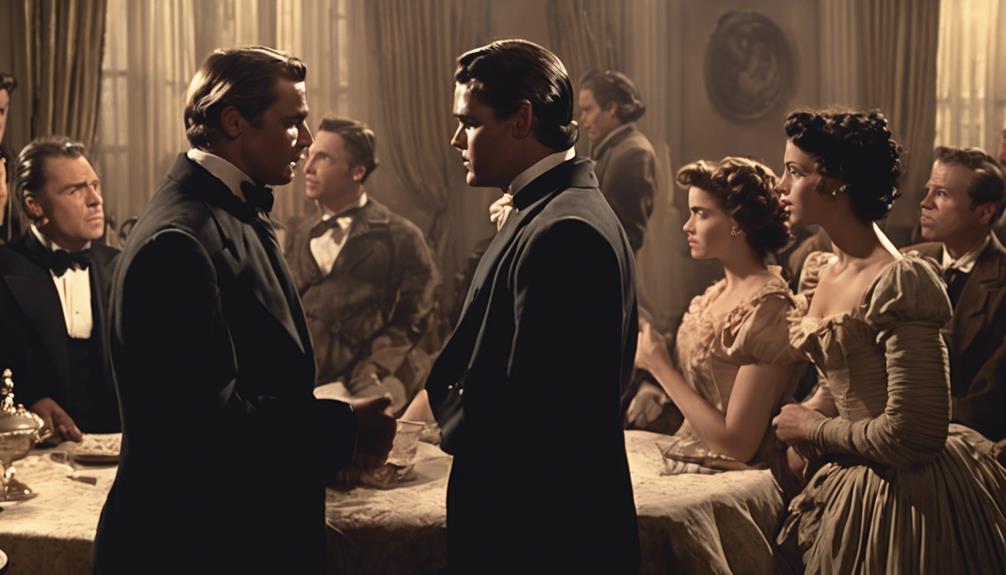
Gone with the Wind garnered favorable reviews from critics upon its initial release in 1939, applauding its epic scale and standout performances. Critics praised Scarlett O'Hara's complex character development and the emotional depth portrayed in the film.
Key points highlighted in the reviews included:
- Detailed phonetic spellings brought authenticity to the dialogue, enhancing the historical references and setting.
- The film's portrayal of rich plantation owners undergoing a rapid change of heart during the Civil War captivated audiences.
- The iconic scene depicting the burning of Atlanta left a lasting impact, showcasing the film's grandeur and special effects.
- Providing an intimate look into the lives of societal women in the South, the film resonated with audiences through moments like an emotional hug between Scarlett and Rhett Butler.
Adaptations and Legacy
Adapted into a highly acclaimed film in 1939, 'Gone with the Wind' solidified its cultural impact through a legacy that continues to influence cinematic portrayals of the American South. The film boasted an iconic cast, including Vivien Leigh, Clark Gable, Olivia de Havilland, and Hattie McDaniel, breaking barriers and leaving a lasting mark.
Despite criticisms for its historical portrayal, the movie remains a cinematic masterpiece, shaping subsequent depictions of the South. Periodic re-releases throughout the 20th century kept 'Gone with the Wind' in the public eye, setting viewership records during TV premieres and enhancing its cultural impact.
Selznick's strategic sale of the film to MGM in 1942 paved the way for further enhancements and re-releases, ensuring the movie's enduring legacy. The film's ability to spark conversations about race, history, and cinema has solidified its place in the annals of film history, making 'Gone with the Wind' an essential piece of American cinematic heritage.
Historical Context
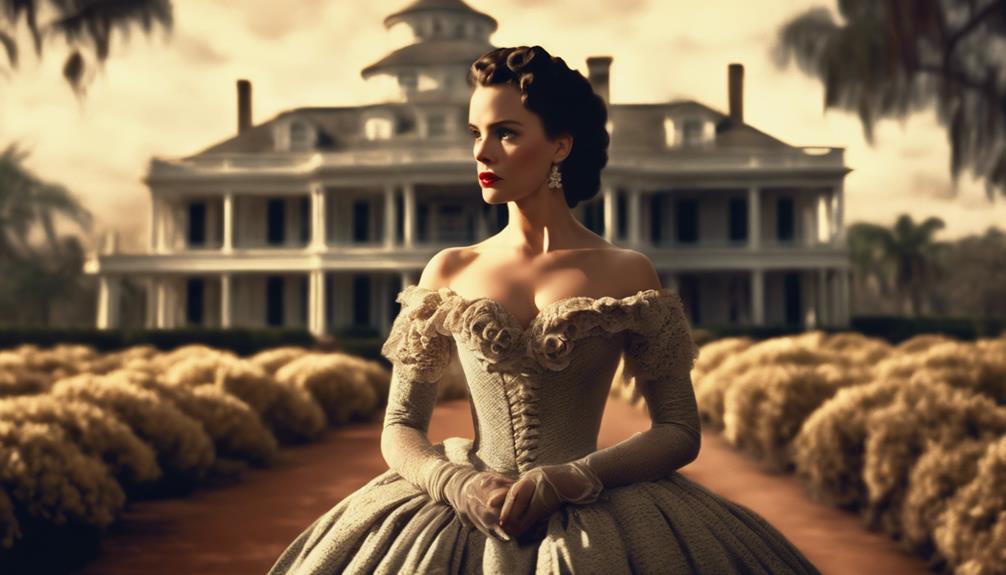
Exploring the historical backdrop of 'Gone with the Wind' reveals a Southern perspective on the American Civil War, shedding light on societal transformations and personal struggles during this tumultuous period. The novel captures the rapid societal changes experienced by Southern communities, delving into the horrors of war and the futility of its violence. Mitchell's narrative vividly portrays the impact of the Civil War on individuals and families, offering a glimpse into the deep personal struggles faced by many.
The book provides insights into the reasons for secession, including issues such as unfair taxes, states' rights, and the institution of slavery.
Descriptions in 'Gone with the Wind' vividly depict the devastation and chaos brought about by the Civil War, with most of the battles occurring in the South.
Mitchell's exploration of the futility of war resonates throughout the novel, highlighting the profound effects on both individuals and Southern society.
Through the lens of Southern characters, the novel captures the complexities and challenges of the era's societal transformations.
Controversies Discussed
Controversies surrounding 'Gone with the Wind' explore its contentious portrayal of the antebellum South and its treatment of slavery. The novel and film have faced criticism for romanticizing the Confederacy and perpetuating racial stereotypes.
Discussions often scrutinize the historical accuracy of the narrative, questioning its ethical implications and the glamorization of a dark period in American history. The character portrayals within the story have also sparked debates about racial representation and the overall depiction of the Civil War era.
Despite its popularity, 'Gone with the Wind' continues to be a point of contention, prompting reevaluation and calls for a more critical examination of its themes. The controversies surrounding the work highlight the need for a nuanced understanding of how stories like these shape perceptions of the past and influence contemporary discussions on race, gender, and historical interpretation.
Film Adaptation Comparisons
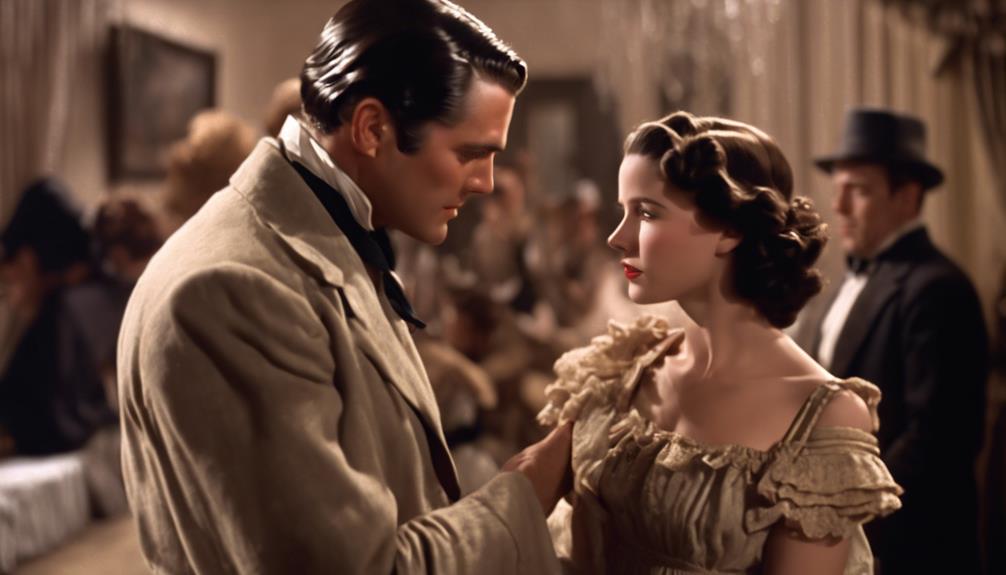
Comparing the film adaptation of 'Gone with the Wind' to the novel reveals notable differences in character portrayals and visual storytelling techniques. In the film adaptation:
- Vivien Leigh and Clark Gable brought Scarlett O'Hara and Rhett Butler to life with their iconic performances.
- Hattie McDaniel made history by winning an Academy Award for her portrayal of Mammy, a significant milestone in the film industry.
- The casting process for Scarlett O'Hara was rigorous, involving 1,400 auditions before selecting Vivien Leigh for the role.
- Despite criticisms of its portrayal of history, the film's success led it to win ten Academy Awards, including Best Picture.
The film's enduring popularity highlights its impact on cinematic history. The performances of Vivien Leigh, Clark Gable, and Hattie McDaniel, along with the meticulous casting process, contributed to the film's lasting legacy.
Conclusion
So, now you know the epic tale of 'Gone with the Wind' – a story of love, loss, and resilience set against the backdrop of the Civil War.
As you reflect on the characters, themes, and controversies surrounding the novel, you can't help but wonder: is it really worth all the fuss?
Well, frankly my dear, the legacy of this iconic work speaks for itself.
Love it or hate it, 'Gone with the Wind' is here to stay.

